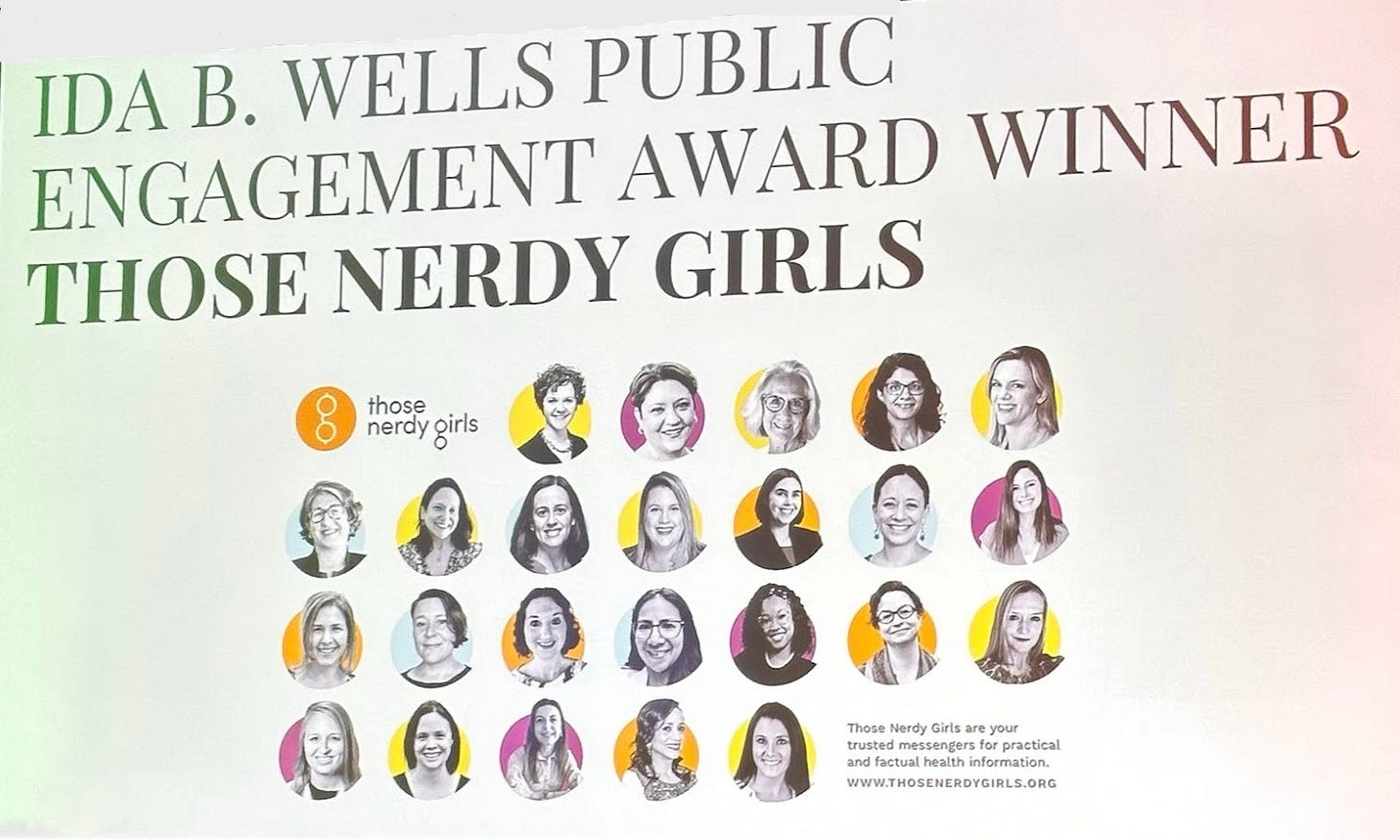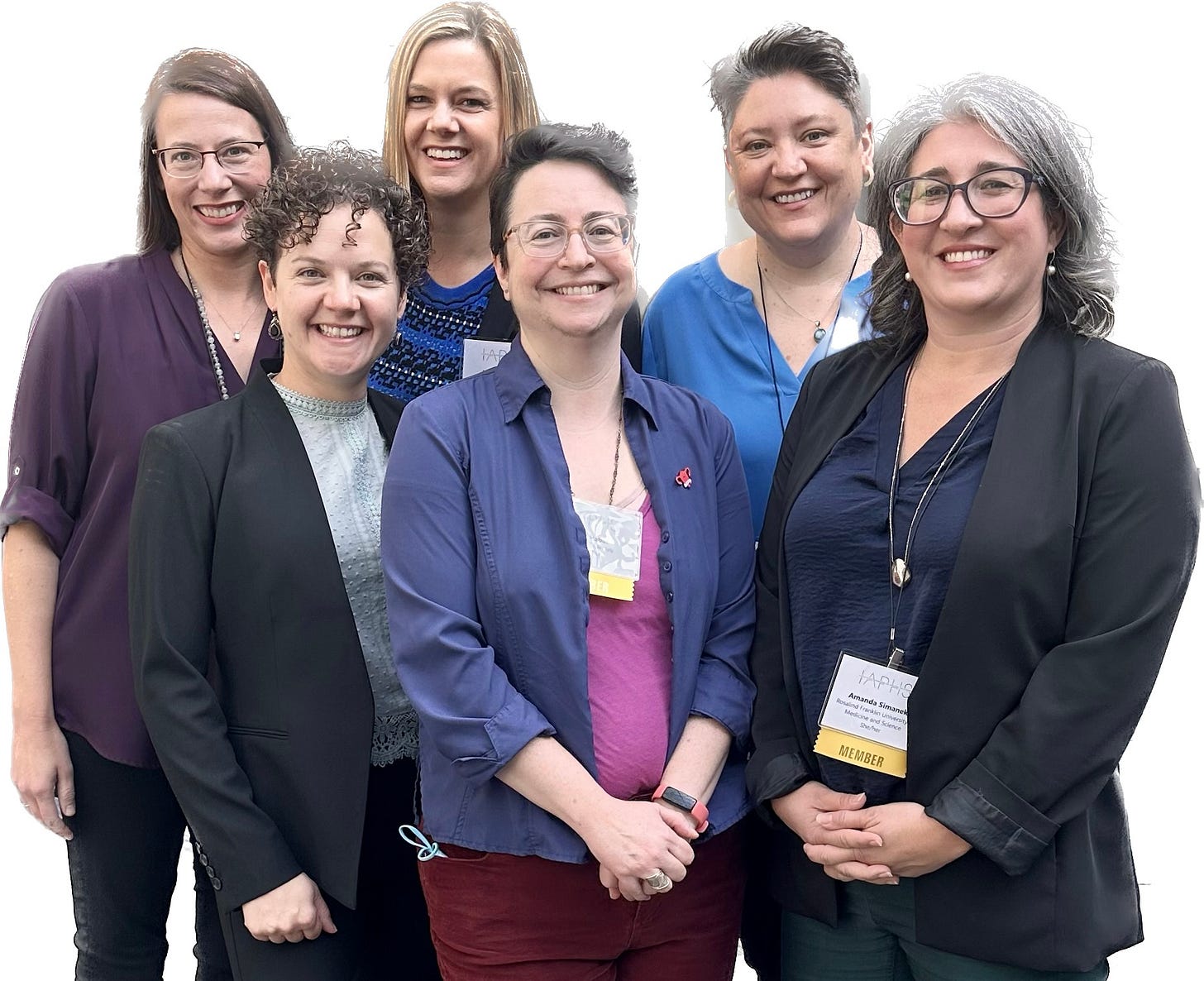Those Nerdy Girls receive the IAPHS Ida B. Wells Public Engagement Award!
Those Nerdy Girls is funded by reader donations. Help keep the lights on by becoming a paid subscriber today.
Last week in Baltimore, MD, Those Nerdy Girls proudly accepted the Ida B. Wells award for Public Engagement from the Interdisciplinary Association of Population Health Scientists. Several present and past nerdy girls attend this annual scientific conference, and we were delighted to be in Baltimore, MD to accept the award.
We were introduced by noted sociologist of race and science, Troy Duster, who had recorded a video introduction. Dr. Duster’s introduction focused on our mission and how it relates to the legacy of the award namesake Ida B. Wells, who was a journalist, researcher, and civil rights advocate. Wells was also a pioneer in using data and plain language science communications to drive social change. Duster’s introduction was especially meaningful because Ida B. Wells was his grandmother.
Co-founder Malia Jones delivered an award acceptance speech, which we’re happy to share with you today.
_________________________________________________________________________
Thank you,
Before we begin, I would like to briefly acknowledge that the land we are currently standing on is the ancestral land of the Susquehannak and Piscataway people.
It is both a profound honor and a humbling experience to stand before you today to accept the Ida B. Wells Public Engagement Award on behalf of Those Nerdy Girls. As we receive this award, we remember Wells, a trailblazer in journalism and civil rights, whose courage and unyielding pursuit of truth continue to inspire generations. In many ways, her legacy resonates with our mission.
In her groundbreaking 1895 booklet, 'A Red Record,' Ida B. Wells fearlessly illuminated the darkest corners of American society. Armed with her meticulous research and prose, Wells provided 14 pages of statistics on lynchings from 1892 to 1895. It was the first systematic accounting of this epidemic of violence in history. She paired these data with harrowing, descriptive narratives and an unflinching assessment of the root causes of this violence. She found that lynching victims had often challenged White authority or competed with Whites for positions of power, in business or politics. Pairing data and narrative, she exposed lynching as not the unpredictable, random action of rogue mobs, as it was often portrayed in mainstream media; but rather as a form of systematic terrorism perpetrated by White Americans in the post-Civil War era.
These accounts gave readers a dual lens: the one of objective figures and the other of the raw, human tragedy behind each number. Wells masterfully employed the potent blend of storytelling and statistics, challenging an audience that did not want to face such brutalities. Her work is a testament to the power of plain language and statistics in confronting uncomfortable truths for the sake of justice and change.
_______________________________________
In a world brimming with information and misinformation alike, Those Nerdy Girls launched headlong into the chaos of the early pandemic with one goal: to help. We wanted to make science and health information accessible and understandable. In our roles as daughters, moms, and sisters, we have seen firsthand the potential impact that information can have on individuals and communities. The pandemic was not just a health crisis; it was, and continues to be, an information crisis.
Today, as we stand here reflecting on our journey, it's evident that our work–like that of Wells–has always been fueled by two central pillars: a commitment to truth and a desire to serve the public good.
As scientists and clinicians, we felt compelled to step up, to provide the public with the tools and practical information they needed to get through each day.
The clinicians among us work with individuals, making impacts that are incredibly important to the people we touch, but small in a population health sense.
Ashley Ritter, our CEO and capable leader for the last 2 years, said “Those Nerdy Girls provides a venue to share knowledge, experiences, and empathy with a broader audience.”--a place where science and shared human experiences intersect.
Amidst heartbreaking stories of distrust leading to tragedy and challenges to the healthcare system, our readers have been our beacon. Every message of appreciation confirms that we're making a difference, transforming distrust into tales of hope and resilience.
Along the way, the solidarity, shared purpose, and intellectual growth we've achieved together have been unparalleled. Despite the hurdles and losses many of us faced during the pandemic, TNG was our anchor, a place where we found humor, connection, pride, and a sense of purpose.Jenn Dowd said that “writing for TNG doesn't feel like an obligation but a fulfillment of purpose.” We're not just sharing facts; we're contributing to a positive force in the world.
______________________
Our experiences have also been profound learning opportunities. I asked our contributors to tell me what they have learned professionally. Overwhelmingly the answer was: how to write.
Jenn Dowd and I often joke that after three and a half years of writing for Those Nerdy Girls, our academic writing is legit broken. I seriously don’t even know how to use a semicolon anymore.
Scientists using plain language are a radical force of change. I really believe that. Simple and easy to learn writing strategies, like the TL;DR (aka the Bottom Line Up Front or the SOCO–look it up) can transform esoteric facts into life-saving action. Sara Gorman aptly captured it as "paradigm-shifting."
_______________________
On a personal front, our work has taught us to be mindful of the line between dedication and boundaries. Notice I did not say that we learned to “balance” dedication and boundaries. That would be a complete falsehood. So far, our team has included more than 40 women–and all the department meetings, grant deadlines, sick children, sick parents, failing marriages, succeeding marriages, relocations, vacations, unreasonable commutes, and unpaid labor that our lives entail. It very seldom felt like balance to me.
It more often resembled a juggling act, and sometimes not a very good one. Aparna shared one lesson she’s taken away: “I don’t have to do everything all the time. I can lean on others and keep moving forward.” From the beginning, we have had an internal rule: we don’t apologize for having a life.
As we learned to trust one another to pick up those dropped juggling balls without guilt or shame, we found strength and confidence in our collaboration. Working in an all-woman team has reshaped our beliefs about competition and cooperation. We've discovered strength in unity, the power of humility, the potency of active listening, and the transformative nature of working alongside friends and true peers. As MK Haber eloquently said, "I think I have been looking for something like TNG my whole professional life."
_________________________________
The present moment offers unique public engagement challenges. From widening partisan divisions to the daunting and mysterious algorithms driving social media, public engagement with science faces unprecedented obstacles. And at the same time, the threats to population health are unimaginably large and complex. Problems like the climate crisis, the inevitable next pandemic, and gun violence and the epidemic of mass murder in this country.
This brings us back to the legacy of Ida B. Wells, who did the seemingly impossible–she engaged an indifferent public with a problem that seemed too big to solve. She didn't merely present facts; she gave voice to the voiceless and shed light on the darkest corners of society. I’m humbled and inspired by her legacy. Her spirit serves as a reminder that public engagement work is paramount, especially when confronting really big problems.
Receiving the Ida B. Wells Public Engagement Award is not just an acknowledgment of our work but a testament to the importance of public engagement and science communication in the field of population health science. This recognition reaffirms our commitment to ensuring that everyone, irrespective of their background, has access to reliable and actionable health information. Our earnest endeavor remains consistent: to foster an informed society.
To our incredible team of Nerdy Girls, who have volunteered countless hours, often juggling their professional and personal lives, your dedication and zeal have been the driving force behind our success. This award belongs to each and every one of us.
In closing, I’d like to extend our heartfelt gratitude to Chris Bacharach for nominating us for this award and to the award committee for recognizing our efforts. Inspired by Ida B. Wells and fortified by this recognition, Those Nerdy Girls will continue to champion the cause of science, truth, and public engagement.
Thank you.
Malia Jones, PhD, MPH
Assistant Professor, Community & Environmental Sociology, University of Wisconsin-Madison
Co-founder and Director of Research, Those Nerdy Girls
Malia would like to note that she used ChatGPT 4.0 to generate a draft of this speech from her notes. She edited the draft substantially.
ICYMI - Digest of Recent Posts:
Vaccines and Families/Kids: Does getting a COVID vaccine in pregnancy help protect the newborn?
Social & Racial Justice: Honoring Indigenous People’s Day on October 9th
Mental Health: In honor of World Mental Health Day on October 10th: What is PMDD, and what should I do if I think I have it?
Social & Racial Justice: October 11, 2023 was the 11th anniversary of the International Day of the Girl.
Reminder that we now have an online store filled with amazing nerdy merchandise.
Your purchases will help financially support the science communication mission of Those Nerdy Girls.
P.S. We’d love to see pics of you and your friends and family sporting their new TNG swag. You might even be featured in our shop! Email us your pics at info@dearpandemic.org
Like what you read? Please share it with others!
If you have a question, let us know!
We read every question and use them to inform our upcoming content, though we are unable to respond to each specific question.





